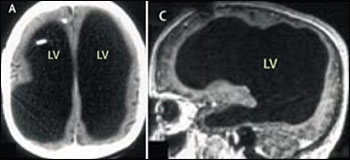We assume that our memories are somewhere inside our cranium. The common belief is that they are stored in brain cells which can be stimulated and retrieved. This view of memory storage is supported by neurosurgeons who use electrical stimulation during delicate brain operations. They do these operations with the patient awake and the electrical stimulation is done to determine which areas of the brain control vital functions so they can avoid damaging or accidentally removing them with a tumor. Frequently, patient report that this stimulation triggers detailed memories of past experiences which are replayed like a video in their mind.

But other medical procedures only complicate the understanding of where memories reside in the brain.
Over many decades of medical history, patients have had large chucks of their brains removed -- just about every region -- and many reported only small or insignificant memory loss. One famous 44 year old French patient [
right] had completely intact memory despite the discovery that his skull almost completely empty! It was full of fluid with just a few centimeters of brain tissue surrounding this empty space, clinging to the bony cranium. He apparently suffered from encephalopathy as an infant and it was never previously detected.
While we don't know where memories are stored, we do know that certain areas of our brain are responsible for recording, archiving, and retrieving them. When these special parts of the brain are injured, like the hypocampus, certain types of memories are unable to be accessed. But when these brain parts recover their function, the old memories are found intact. So where were they hiding?
According to Sheldrake, memory does not reside in any geographic region of the brain, but instead in a kind of field surrounding and permeating the brain. Meanwhile, the brain itself acts as a "decoder" for the flux of information produced by the interaction of each person with their environment.
This is beautifully illustrated in the Australian Aboriginals who seem to "unlock" memories of their ancestors through a highly personal experience they call the "walkabout." At certain times in their lives they venture off on their own in the remote "outback" wilderness where they perform various rituals. The experience seems to unlock memories and knowledge that becomes a part of their personal experience, much as if they had studied or memorized it. Some people think all humans have this innate ability but so-called "modern man" has developed tools like language and writing (and yes, computers) as a substitute for these latent abilities.




